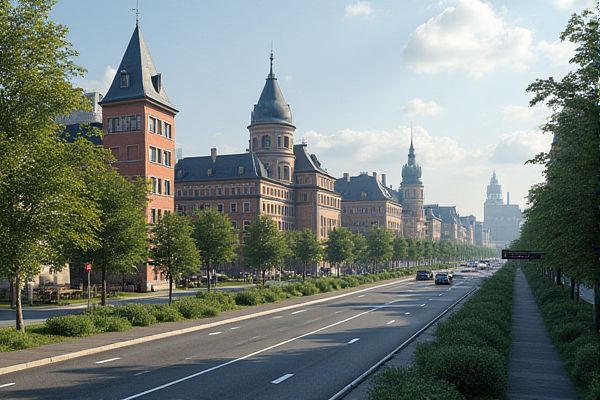
Social and community groups in Germany: Diverse cultural organizations. Numerous expatriate communities. Active volunteer networks. Strong focus on integration. Available language exchange clubs. Frequent community events. Support for various interests. Accessible meetup platforms. Emphasis on sustainability groups. Inclusive LGBT+ organizations.
Diverse cultural organizations
Germany is home to a diverse array of cultural organizations, including the Goethe-Institut, which promotes German language and culture globally, Deutsche Welle, which provides international news and language learning resources, the German Academic Exchange Service (DAAD) for academic exchange, and the Stiftung Preussischer Kulturbesitz (SPK) for preserving cultural heritage, among others. These organizations offer various opportunities for language learners and cultural enthusiasts to engage with German culture through events, courses, and cultural programs. For more insights into how these organizations influence and shape cultural exchange, you can explore the detailed information provided by Cultural Organizations.
Numerous expatriate communities
German expatriate communities, comprising individuals of German nationality or descent living abroad, maintain strong connections to their heritage through language, cultural activities, and social clubs, while also contributing economically, socially, and culturally to their host countries, fostering bilateral relations and cultural exchange. These communities face challenges such as language barriers and cultural differences but play a significant role in enriching local cultures and promoting international understanding. To learn more about how these communities navigate their unique position and maintain their cultural identity, visit Vaia.
Active volunteer networks
In Germany, active volunteer networks such as AFS Germany offer 12-month voluntary service programs focused on various fields including education, social work, environment, healthcare, and culture, providing comprehensive intercultural learning and work experience in the non-profit sector. The International Youth Community Service (IJGD) in Germany also coordinates volunteer programs, involving participants in social, cultural, monument preservation, political, and ecological projects for a year, with support in areas like visa applications, insurance, and training seminars. You can learn more about these opportunities and detailed program offerings by visiting the AFS Germany website.
Strong focus on integration
Germany has a plethora of social and community groups and digital services focused on integrating migrants, including the "Welcome to Germany" website, the "Integreat" app, and various initiatives by organizations like the German Red Cross. These platforms offer support in areas such as language courses, job placement, health, and cultural integration, helping migrants to adapt and thrive in their new environment. For more detailed information on these resources, you can visit the Welcome to Germany page, which serves as an essential guide for newcomers seeking assistance and community in Germany.
Available language exchange clubs
For those eager to practice German with fellow enthusiasts, a myriad of language exchange groups are available in Germany. Cities such as Trier, Berlin, Austin, and Munich host gatherings where participants can meet and enhance their German and other language skills. Among various platforms that facilitate these exchanges, Meetup.com stands out, offering diverse groups like the Trier German Language Meetup and German Conversation in NYC, extending even to global locations. Additionally, websites like italki, Couchsurfing, Polyglot Club, and Tandempartner.net are highlighted by FluentU for bridging the gap between online learning and community interaction, ensuring language learners find the right partners both virtually and in person.
Frequent community events
Community groups in Germany, such as the Germania Society of Cincinnati, actively promote cultural heritage through frequent and vibrant events including Oktoberfest, Christkindlmarkt, Volksmarch, and the Summer Biergarten Series. These gatherings are complemented by monthly meetings that offer dinner, beer, and cultural activities, fostering a sense of community and celebration of traditions. Across Germany, numerous cultural events take place throughout the year featuring festivals like Fressgass' Fest and Mozartfest, each showcasing local traditions, music, and cuisine. Meanwhile, the German American Society of Portland plays a significant role in maintaining cultural ties by organizing annual events like Fasching, Maifest, and Christmas Market, providing platforms for the community to come together and partake in traditional German festivities. These events not only bring the community closer but also ensure that German heritage continues to thrive both locally and globally.
Support for various interests
In Germany, there is a robust landscape of social and community groups that support various interests, including professional associations, cultural groups, labor unions, religious groups, social clubs, and humanitarian organizations. Many individuals belong to multiple groups to engage in social, leisure, and political activities, enriching their overall community involvement. To explore more about these groups and their impacts, visit the Social and Community Groups in Germany page, which provides in-depth insights into how these organizations play a significant role in the fabric of German society.
Accessible meetup platforms
In Germany, several accessibility meetup groups provide platforms for professionals and advocates to share experiences and knowledge in the field of inclusive design. Known groups such as the A11y Meetup Berlin, Munich Accessibility Meetup, and the Accessibility Club have organized events across various German cities including Nuremberg, Berlin, and Munich. One prominent group, the A11y Meetup Berlin, hosts over a thousand members focused on web accessibility. These groups unite to inspire and support each other, enhancing accessibility awareness and fostering a collaborative environment for tackling challenges within the field.
Emphasis on sustainability groups
In Germany, several prominent sustainability groups focus on environmental protection and social sustainability. Organizations like the German Association for the Environment and Nature Conservation (BUND), the German Environmental Aid Association (DUH), Greenpeace, NABU, and WWF Germany are actively involved in campaigns, political lobbying, and public education to promote sustainable practices, protect biodiversity, and address climate change.
Inclusive LGBT+ organizations
In Germany, inclusive LGBT+ organizations such as Rubicon e.V., Centrum Schwule Geschichte e.V., LSVD+ - Verband Queere Vielfalt, and Anyway e.V. provide comprehensive support, including counseling, anti-violence initiatives, educational programs, and community events, with significant government funding and community involvement to promote LGBTQ+ rights and inclusivity. These organizations collaborate extensively to ensure a supportive environment for all members of the LGBTQ+ community. To learn more about these collaborative efforts and the future of LGBTQ+ communities in Germany and the United States, you can explore the upcoming event discussion at Building LGBTQ+ Communities.
